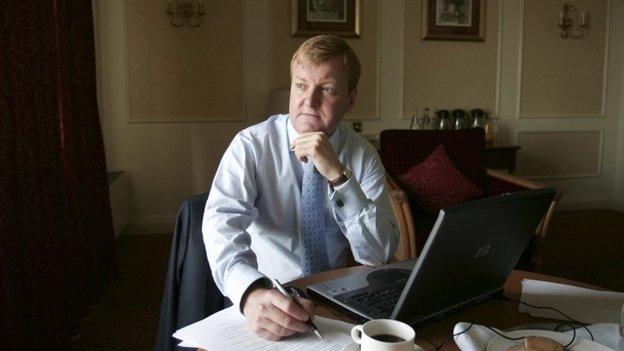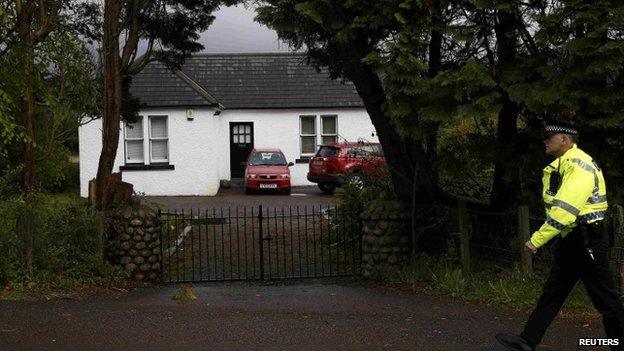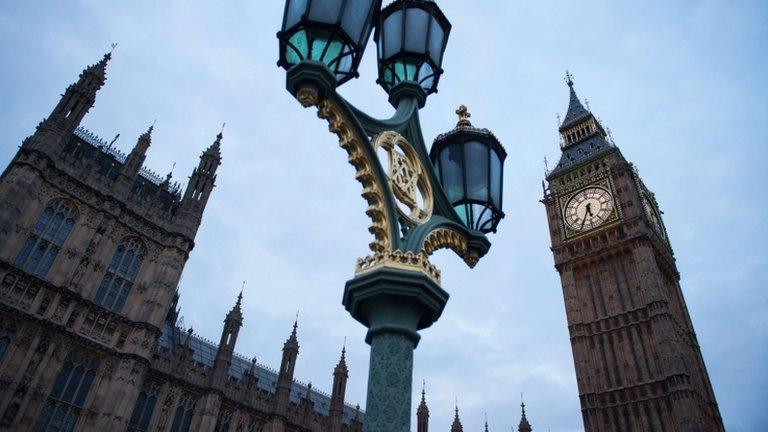Charles Kennedy died of 'haemorrhage linked to alcoholism'
- Published

Mr Kennedy was an MP for 32 years before losing his seat last month
Former Lib Dem leader Charles Kennedy died of a major haemorrhage linked to alcoholism, his family have said.
Mr Kennedy, who led the party between 1999 and 2006, died at his home in Fort William on Monday aged 55.
Following a post-mortem examination, his family issued a statement saying his unexpected death was "a consequence of his battle with alcoholism".
"Ultimately this was an illness Charles could not conquer despite all the efforts he and others made," they said.
'Affection'
Details of Mr Kennedy's funeral arrangements will be released in due course.
Mr Kennedy fought a long battle with alcoholism, which he first publicly revealed in 2006 when he stood down from the leadership of his party, just eight months after leading it to its best-ever performance at an election.
After his death was announced on Tuesday, the police said they did not believe there were any suspicious circumstances.

Charles Kennedy: 1959-2015


In their statement the family said the Procurator Fiscal's post-mortem report "makes clear his (death) was a consequence of his battle with alcoholism".
"We are grateful to the many friends and also medical experts who sought to help down the years but ultimately this was an illness Charles could not conquer despite all the efforts he and others made," they said said.
'Terrible illness'
The family said they had been "touched beyond measure by the outpouring of warmth" from all parts of the country and all sides of politics following Mr Kennedy's death.
"The pain we feel has been at least eased somewhat by the reaction of so many people across Scotland, the UK and beyond, and by the affection expressed by politicians across the spectrum.
"It has become all too apparent to us how much Charles meant to so many people and how many lives he touched."
Mr Kennedy's 10-year old son Donald and his ex-wife Sarah were in Parliament on Wednesday to listen to 90 minutes of tributes, led by Prime Minister David Cameron, Lib Dem leader Nick Clegg and Labour leader Harriet Harman.
Many of the MPs who spoke addressed their comments to Donald, who was born during the 2005 general election, saying he could be rightly proud of how his father had conducted himself in his 32-year political career and the difference he had made.

What are the long-term effects of alcoholism?
By Philippa Roxby, BBC News health reporter
The effects of long-term alcohol addiction do not just affect the liver.
Drinking large amounts over many years will take its toll on other parts of the body, including the heart, pancreas, brain and nervous system.
Heavy drinking can increase blood pressure and blood cholesterol levels, which are both major risk factors for heart attacks and strokes. It can also weaken the immune system, increase the risk of a range of cancers and make people more prone to depression, dementia and infertility.
Drinkers at high risk of damaging their health are those drinking more than eight units of alcohol a day or 50 units a week, for men, and more than six units a day or 35 units a week, if you're a woman.
That's equivalent to several pints of strong lager or a bottle of wine every night. With no alcohol-free days to let the body recover between drinking, health problems will automatically begin to pile up.
But NHS Choices warns that alcohol can start to have a health impact at even lower levels - when drinking more than the recommended weekly amount of 21 units for men and 14 units for women.
Giving up alcohol when it has become a habit is not easy. Recognising there is a problem is often the first important step - but it is just the start. NHS Choices recommends going to see a GP and being honest about how much you drink, before trying to cut down gradually. Its website, external has more information on which organisations to contact for help.

The family's statement adds: "The words and images of that day, and of so many other tributes, will be there for us to look back on with pride in Charles, and Donald will always know what a special father he had."
Tony Blair's former communications director Alastair Campbell, who was a friend of Mr Kennedy's despite the two being on opposite sides over the Iraq War, said he hoped it would make politicians take alcoholism more seriously as an illness.
"None of us are surprised that alcoholism played a part in his tragic death but what has been great about the tributes is that they have focused on so much more than this.

Mr Kennedy died at his home in Fort William
"I hope that remains the case as people continue to remember him as we move towards the funeral and then subsequent memorials.
"I also hope that politicians of all parties develop a better understanding of alcoholism, take it more seriously and devise policies to treat it as a disease on a par with the other major diseases."
And Scottish Liberal Democrat leader Willie Rennie said he hoped the days when people felt "a little bit embarrassed" to talk about such a personal issue in public were over.
"We need to remember Charles for all his achievements, not just how he died," he told the BBC News Channel. "I hope we can also use this tragic moment to understand a little bit more about what alcoholism is and what it does to people.
"We need not to be ashamed of the illness, just like we would not be ashamed of any other illness, so that it allows people to be open and seek the help they need to deal with what is a terrible illness."
- Published5 June 2015

- Published4 June 2015

- Published2 June 2015
